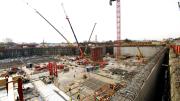Harvard will slow the pace of construction on its new Allston campus, President Drew Faust announced today.
Construction crews already at work on the first science building there will complete the foundation and installation of below-ground structural beams, tasks that were supposed to take up most of 2009 and are continuing on pace. But Harvard will hold back on procuring materials for anything above ground, Christopher M. Gordon, chief operating officer of the Allston Development Group, said in a conference call with journalists this afternoon.
Meanwhile, the University will conduct a thorough review of the project's overall scope and pace. The options, Faust said in her statement, include proceeding as originally planned (if economic conditions improve rapidly); reconfiguring the building "in ways that yield either new cost savings or new space realization"; and pausing construction completely.
The building has thus far been discussed in large, round numbers—1 million square feet, $1 billion. Faust declined, during the conference call, to offer more detail about those numbers and how they might change in the cost options being considered, but she did say that increasing the first science building's square footage is one of those options.
Meanwhile, with that building’s projected 2011 opening date possibly delayed, two entities that were supposed to be housed there—the interfaculty department of stem-cell and regenerative biology and the new Wyss Institute for Biologically Inspired Engineering—will be moving into new or renovated space in Cambridge and Longwood instead. The Harvard Medical School department of systems biology will remain, for the time being, in Longwood, although there are still hopes of bringing it closer to its sister in the University-wide initiative in systems biology, the Faculty of Arts and Sciences (FAS) Center for Systems Biology.
If construction does come to a halt, Faust vowed that the University would "work with the City of Boston to ensure that both safety and aesthetic concerns are addressed" while the site is dormant.
She emphasized that whatever happens with the building later this year, Harvard is not pulling back from the Allston project altogether. "Harvard's 50-year vision for Allston is undiminished, regardless of these short-term challenges," she said in a statement. "Allston is vital to Harvard's long-term future."
Faust estimated that the endowment has lost 30 percent of its value since it peaked at $36.9 billion last June 30. She noted that the Harvard Corporation has delayed its announcement of the endowment distribution amount for next year (traditionally done each fall), citing the high level of economic uncertainty. But $1.4 billion is due to be distributed for operating expenses this year—and that amount, she said, is 50 percent higher than the distribution the last time the endowment stood at its current value (about $26 billion, using Faust's rough calculation). "If we continue to take out the same amount" in future years, she said during the conference call, "we are really taking out a huge percentage."
Faust announced the Allston decision on the same day she released a letter to the Harvard community summing up other University cost-cutting measures, including a retirement incentive and a salary freeze for non-union workers. The president wrote:
It is our collective obligation to face the situation with the right balance of short-term focus and long-term ambition, for ourselves and for the generations whose opportunities will be shaped by our choices.
She also announced that undergraduate tuition, room, and board charges for 2009-10 will increase by 3.5 percent over the current year's costs (the same increase as last year)—to $48,868. Tuition alone will be $33,696, also a 3.5 percent increase.
FAS Dean Michael D. Smith noted that although the percentage increase did not change from one year to the next, and although financial-aid policies are not changing, the College expects to spend $147 million on need-based aid next year—an increase of 18 percent over the current-year budget. "Despite unprecedented economic challenges, we remain fully committed to ensuring that Harvard remains open to talented students from across the economic spectrum," he said. (Read the FAS announcement on tuition and financial aid, also released today, here.)









